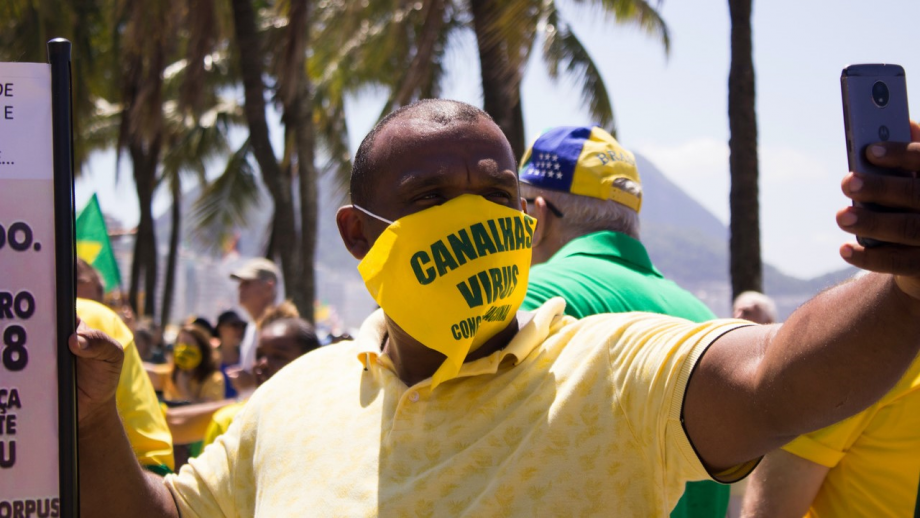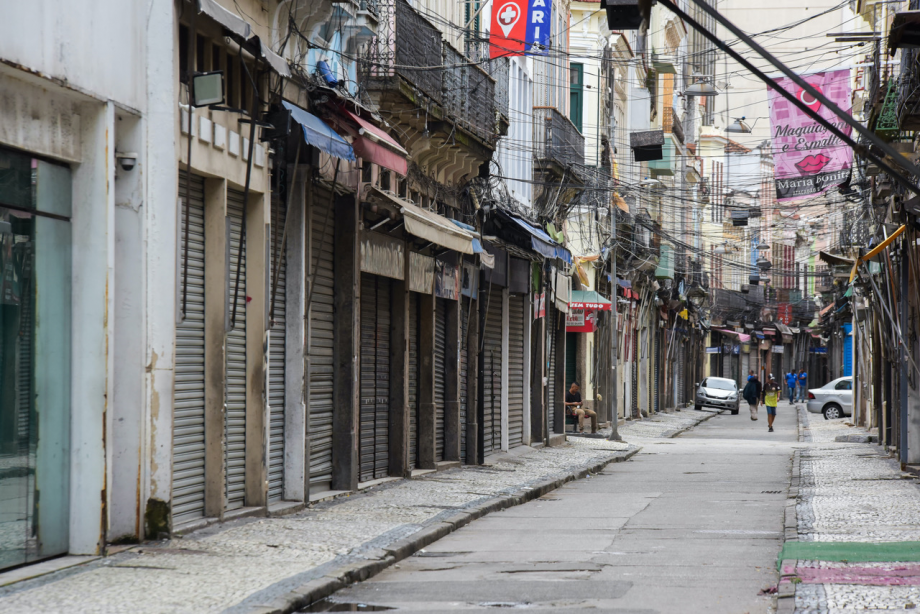Silent Encroachments
Counting and grappling with Covid-19 in unequal Brazil
Life, as we know, has been abruptly disrupted. In Brazil, talk about the coronavirus and the mechanics of contagion and containment come into contact with political exasperation and make salient the contours of the country’s deep-seated social and economic inequality. The politics of virus recognition—whether the virus is actually discernible and should be taken seriously—has taken roots throughout the social fabric and has become an essential topic of everyday conversation. “This is just another flu,” I heard a neighbor tell another over their windows the other day. “We’ll soon have a vaccine, and politicians will create the next problem to occupy themselves with.”

Pro-Bolsonaro activists taking to the streets March 15. Source: Tatiane Silva / shutterstock.com
Having imposed early on a self-quarantine, I have observed the number of cars parked around the place where I live during working hours sprout over the last days. People are being sent home from work, rerouted into part-time schedules or mandatory vacation leaves, or simply laid off with no evident tax relief or unemployment benefits on the horizon. Things have been escalating quickly since last Sunday (March 15), when Brazil saw a first surge in the official number of infection cases alongside nationwide demonstrations led by supporters of far-right president Jair Bolsonaro. First involved in controversies over whether he contracted (or spread) coronavirus following a diplomatic visit to President Trump at his Mar-a-Lago private residence, Bolsonaro saw members of his cabinet testing positive for the virus one after the other. Still, he (and his politician sons) insisted on downplaying the widespread infection as a “phantasy,” attacking the Chinese government for having allegedly planted the virus, and upending democracy by fueling demonstrations against Congress and the Judiciary.

“Shops closed in Rio’s largest popular trade area after city-wide lockdown. Source: Photocarioca / Shutterstock.com
Amidst the President’s lack of responsive action, entire neighborhoods are taking preventive and sometimes extreme measures to prevent the virus from spreading further. “Vila Jansen,” the news says, a German-speaking rural community in Southern Brazil has been quarantined after the first case appeared today. “We issued a decree to protect people,” the mayor announced in a war-toned speech. “This is a very obedient community. Social isolation is the way,” he added. “Besides, we can issue fees and put people in jail if they fail to respect our measures.” As businesses close, public transportation cuts on capacity, GNP growth predictions are revised to zero, Bolsonaro toughens up his response. In Porto Alegre—the capital of Brazil’s southernmost state of Rio Grande do Sul—the police are starting to be deployed to run through downtown roads and announce, through a mobile sound system, that “the virus is real; please stay at home.” Eager to show action, the minister of defense announces Operation Covid-19 on TV, a bold plan to make the armed forces available to help with infrastructure and logistics, following Congress’s approval of a state of emergency which extends the President’s fiscal powers. In buses and trains of São Paulo, nurses on their way to work in hospitals were documented being assaulted by passersby in panic to protect themselves against the virus, while educative videos on TV teach how to sanitize hands and devise new ways to socialize by distance.
While the virus runs amok, the politics of counting becomes an imperfect measure reinforcing structural inequalities and everyday perceptions of the coronavirus as less than real. The first fatal casualty in the state of Rio de Janeiro, some news outlets report, almost escaped the Coronavirus counting. A sixty-three-year-old domestic worker caught the disease through her boss, a well-off resident of Leblon—the city’s iconic and expensive beachfront neighborhood—who had just returned from Italy showing symptoms of Covid-19. While the boss was quickly served with a test through the private health network, the domestic worker continued to live with and help the family as she lived too far away from her home, on the outskirts of the city. When she fell ill, the boss called her family to pick her up; and as shortness of breath developed aggressively, the housekeeper was taken to a public hospital, where she would die within twenty-four hours. It wasn’t until the boss received back her own test from the lab and made it into the official statistics of corona-infected people that attention to the death of the housekeeper as potentially caused by the virus came into public scrutiny.
This dire situation, once again, prompts debates about the persistency, scale, and invisibility of social and intimate hierarchies in times of pandemic. Brazil has over six million domestic workers, the majority of which are either informal workers or day-by-day professionals (“diaristas”) whose families live in poorly serviced shantytowns, favelas, or social housing complexes. These densely populated areas pose questions of public health and impending economic precarity as they offer fertile terrains for both the spread of the virus and the systemic invisibility of inequality structures, in Rio and elsewhere. As more and more celebrities, politicians, and CEOs come public announcing their membership in a terrifying but selective population of individuals who tested positive, the relentless spread of the virus raises questions about the imbalances of access to the technologies of testing and isolation—or the right to know and fight the infection—in the first place.
In many parts of the developed world that were deeply impacted by prospects of a major economic recession, we are seeing sweeping measures to contain losses and help small businesses and taxpayers through something akin to a universal basic income–a proposal that, for decades, was regarded by free-market pundits as revolutionary and deranged. In moments of acute crisis such as ours, even the likes of Trump seem forced to cling to it, suddenly rendering political positions like Sanders’s social capitalism less radical. While talk about a change in the political-economic infrastructures of our societies is starting to take place—the termination of neoliberalism as we know it, the preannouncement of a new era of strong state intervention in the economy, the end of decorative social responsibility by big corporations—I’m less assuaged about what all this means for developing economies around the world. Brazil’s Minister of the Economy recently announced a plan to issue R$ 200 vouchers (some US$ 40) for up to three months to help informal workers wrestle with the economic impact of the pandemic—a figure that hardly covers the inflated costs of basic groceries as people in cars run to supermarkets to stock food and brace for the worst.

Joint initiative seeks to “translate” standard information received from public authorities to the realities and languages of favela residents.
Source: https://www.facebook.com/favelascontraocoronavirus/ usage authorized by the authors
In face of such calamity, many have argued that, while the virus does not make distinctions based on age, gender, race, and class, the kinds of responses governments and markets implement do. More than 40% of the Brazilian economy is still comprised by informal workers—a number that has grown in the wake of the dismantling of social programs under the Temer and Bolsonaro administration. For these citizens, the practice of social distancing remains a luxury few can afford. For the bottom half of society, everyday social contact is not merely an exercise of cultural sociability; sharing, borrowing, outsourcing, and giving care are all means to make ends meet and hustle in an economy that is mostly invisible and must not stop. “Let’s help our community,” an online Uber Eats campaign reminds us, promising free, “socially safe” deliveries that will help those workers without the choice to stay home in isolation. So does Netflix in their advertisements, promising a world of entertainment for the tough days and signaling new horizons of profitability for the so-called “platform economy.” The coming weeks are indeed going to be critical for our future as mankind, as leaders and experts make visible the virus, contain its spread, and coordinate political-economic responses. Meanwhile, in places like Brazil, local life must find ways to move on despite—and beyond—the virus.
Despite the lack of scientific evidence on coronavirus so far, we know that places with high populational density and precarious infrastructure are being hit hardest. There have been incredible initiatives around the world to help stymie the disastrous effects of the sanitary, economic, and social breakdown for the poorest. Keeping with the spirit of help, I would like to share two crowdfunding platforms engaged in bringing essential health and food supplies to the residents of favelas in Rio de Janeiro and Porto Alegre. Many of these initiatives have flourished from long-term exchanges between researchers and communities. They are also using small and big data to track focal points where the disease is spreading more quickly, and help is more urgently needed.
– Central Única Das Favelas do Rio De Janeiro: a Rio-based NGO that seeks to disseminate the cultural life of favelas worldwide. To donate, please access https://www.vakinha.com.br/vaquinha/ajude-a-cufa-a-ampliar-seu-combate-ao-coronavirus
– Coletivo Autônomo Morro da Cruz: a Porto Alegre-based NGO that seeks to promote cultural and social activities for economically vulnerable kids and youngsters. To donate, please access https://www.moedadobem.com.br.
Written on March 21, 2020.
Dr. Moisés Kopper recently finished an Alexander von Humboldt postdoc at the Max Planck Institute for the Study of Societies and has submitted a project on the politics of inequality to the DFG to be hosted by the GSSC. He has worked on issues of social housing, infrastructure, class formation, and citizenship in Latin America and Brazil. More on research and profile: www.moiseskopper.com
#WitnessingCorona
This article was simultaneously published on the Blog Medical Anthropology. Witnessing Corona is a joint blog series by the Blog Medical Anthropology / Medizinethnologie, Curare: Journal of Medical Anthropology, the Global South Studies Center Cologne, and boasblogs.

































